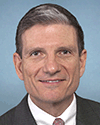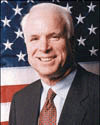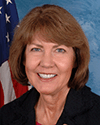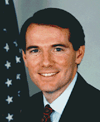News from the Votemaster
• Is the Conventional Wisdom about Trump Wrong?
• What Would Trump's Platform Look Like?
• Conservative Group May Drop Cruz for Rubio
• Trial Balloon: Brian Sandoval to Replace Scalia
• Senate Races Beginning to Heat Up
Republicans Will Debate in Houston Tonight
Professional politicians may be bright, well-educated, well-spoken, and highly charismatic. What they are not, however, is imaginative. As Jeb Bush flailed about in the past six months, desperately trying to get some traction, his instinct was not to change things, but instead to double-down and triple-down on tactics that already weren't moving the needle: More speeches, more town halls, more members of his family hitting the campaign trail, and more commercials.
The same dynamic is in play in the debate scheduling. The first presidential debates were held in 1960, and for several cycles thereafter, the American people managed to get through the entire season with perhaps three or four debates. But if four debates are good, goes the politician-think, then eight debates are even better, right? Or twelve? Or sixteen? And so it is that we find ourselves with the tenth GOP candidates' debate. Along with, of course, seven "undercard" debates. Plus seven and counting on the other side of the aisle. That's 24 overall, eight more than were held in the first 200 years of the republic combined. Of course, that's not really enough, so the GOP just added another meeting to the two that were already scheduled, which means that with the four remaining Democratic tilts, we still have seven more debates remaining in primary season.
Host CNN, for its part, refused to show some backbone, and ultimately decided to invite all five remaining Republican candidates to participate. So, the same lack of imagination that gives us 10,000 commercials and 20-plus debates will surely be on display this evening, at least for four of the five candidates. Ben Carson will offer little beyond incomprehensible policy statements and jokes about how little speaking time he gets. Gov. John Kasich (R-OH) will play the "nice guy" card. And although they know beyond any shadow of a doubt that Donald Trump is approaching "unstoppable" status, Sen. Ted Cruz (R-TX) and Sen. Marco Rubio (R-FL) will continue to focus on one another. That will leave Trump—a living, breathing example of how going against the grain and mixing things up once in a while is a good thing, especially in the current political environment—free to take pot shots as he sees fit. This has been the basic pattern for the last five, six, seven debates and there's no reason to expect it to change now.
In any event, the festivities begin at 8:30 p.m. EST on CNN, CNN.com, and in Spanish on co-sponsor Telemundo. Viewers can tune in to see if the candidates have a surprise up their sleeves for once or, failing that, to play the debate drinking game. If nothing else, it should be interesting to see the candidates try to explain their views on immigration to Latino voters. (Z)
Is the Conventional Wisdom about Trump Wrong?
The conventional wisdom says that Donald Trump can't be the Republican nominee for a variety of reasons. The main ones are these:
- Trump's ceiling of support is 40%
- Trump will ultimately be hobbled by a lack of organization
- As candidates drop out, their supporters will cling to the remaining non-Trump candidates
The Nevada results suggest they may all be wrong. To start with, he got 46% in Nevada. That is getting perilously close to 51%. A candidate with a ceiling of 51% can win the nomination. Winning a caucus requires a big ground operation. Somehow he managed to pull it off. According to entrance polls, Ted Cruz's supporters look a lot like Trump's demographically. If Cruz is ultimately forced out, it is far from clear they would jump onto the Good Ship Rubio. A year ago the conventional wisdom said a Trump candidacy would be a big joke. No one is laughing now. (V)
What Would Trump's Platform Look Like?
If Donald Trump wins most of the marbles next Tuesday, when a dozen states vote, he will be very hard to stop. If ultimately he controls more than half the convention delegates, he can write any platform he wants. Meanwhile, the chairman of the Republican National Convention, Speaker Paul Ryan (R-WI), has some pretty clear ideas what he would like in the platform. The trouble is that Ryan's ideas and Trump's idea are completely incompatible, which puts them on a collision course. Furthermore, tradition dictates that once the convention chooses a nominee, he is the head of the party and everyone else is expected to fall in line. It's not going to happen.
To start with the basics, Trump really isn't a Republican. He was a Democrat most of his life and has espoused things Democrats like, not things Republicans like. Consider a few issues. Republicans support free trade deals; Trump strongly opposes them. Republicans want to defund Planned Parenthood; Trump supports the organization. Republicans despise the use of eminent domain (even though it is a power explicitly granted to the federal government by the Constitution); Trump, who wanted to use it to demolish a widow's house to make way for a limousine parking lot in Atlantic City, calls it "wonderful."
But there is more. Much more. Ryan supports developing domestic oil, gas, and other energy sources. Trump wants to take over Iraq's oil by military force. Ryan wants to rein in entitlement programs. Trump says past attempts to do so are why Romney lost in 2012. Ryan wants to attract Latinos to the party. Trump wants to deport 11 million of them, many of whom have brothers, sisters, uncles, and aunts who are voting citizens. Ryan strongly supports Israel. Trump wants to be neutral in the Arab-Israeli conflict.
It is completely unpredictable what the platform might look like. Could the two sides compromise, when "compromise" is a dirty word to most Republicans? There are some areas of agreement, of course, like opposition to the Affordable Care Act, but even there Ryan and Trump aren't entirely on the same page. Trump supports the individual mandate, Ryan opposes it. If Trump gets onto a glide path to the nomination next week, the battle over the platform will start to heat up. (V)
Conservative Group May Drop Cruz for Rubio
A secret group of conservative Republicans is seriously considering ditching their boy, Ted Cruz, for Marco Rubio, if Cruz doesn't do well next Tuesday. They really don't want Trump and if Rubio is the only way to stop him, so be it, even if Rubio is far less conservative than Cruz. In addition to doing badly in South Carolina and Nevada, Cruz has been caught being dishonest too many times this week. Besides, evangelical voters, who were supposed to like him, don't seem to be voting for him. (V)
Trial Balloon: Brian Sandoval to Replace Scalia
A trial balloon being released by the White House has Gov. Brian Sandoval (R-NV) as a possible replacement for the late Antonin Scalia on the Supreme Court. Senate Republicans have said they will not even hold hearings on any nominee. Sandoval could throw sand in the gears. For some Republican senators, who secretly think Hillary Clinton is going to be the next President, getting a moderate Republican onto the Court has to be a lot better than taking a chance on who Clinton might nominate. On the other hand, this sort of trial balloon happens all the time in Washington. Somebody leaks a rumor and then sees what the reaction is. (V)
Senate Races Beginning to Heat Up
As the presidential races begin to shake out, there will be increasing attention paid to the Senate races, where most of the match-ups will be set by mid-April. The Democrats' excellent chances at retaking the Senate already afforded a great deal of drama, and the debate over replacing Antonin Scalia has added another layer of intrigue on top of that. Among the more important developments in the last month or so:
- In Alaska, incumbent Sen. Lisa Murkowski (R-AK)—who had to resort
to a write-in campaign in her last election, could very well face challenges
from the left, right, and center. In a lightly-populated state like Alaska,
anything could happen.
- Sen. John McCain (R-AZ) may be well-known, but his propensity for compromises
has not made his constituents happy. Up against a tea party challenger in the
primaries, and popular Rep. Ann Kirkpatrick (D-AZ) in the general election, McCain
appears
to be in serious danger.
- The Democratic establishment wants Rep. Tammy Duckworth to challenge Sen.
Mark Kirk (R-IL) in November, but attorney Andrea Zopp has other ideas and is
running against Duckworth in the Democratic primary.
A new poll
from Southern Illinois University Carbondale has Duckworth at 52% and Zopp at
6%, so it looks like the Democrats will get their favored nominee. If so, it
will pit two candidates against one another for whom health concerns will play a
larger-than-average role in the campaign. Duckworth is a double amputee as a
result of the Army helicopter she was piloting getting shot down in Iraq. In
addition to her losing both of her legs, her right arm was severely injured.
Kirk has different medical issue. In 2012, he suffered a major stroke and has
been slowly recovering ever since. Normally a candidate who is fighting back
from a stroke would get a sympathy vote, but against Duckworth that is
unlikely.
- Rep. Todd Young (R-IN) appeared to be well on his way to the GOP nomination
for retiring Senator Dan Coats' seat, but then it turned out his candidate
petition was short on signatures. The Indiana Election Commission, voting along
party lines, threw out the challenge, but a lawsuit from Indiana Democrats or
from Young's tea party rival Rep. Marlin Stutzman (R-IN) is still well within
the realm of possibility.
- The Democrats came up with a serious challenger for Sen. Rand Paul (R-KY) in
the form of straight-talking Lexington Mayor Jim Gray. Kentucky is bluer than
you think, and the state's citizens are not thrilled over Paul's presidential
dalliance.
- In Pennsylvania, maverick former admiral Joe Sestak and establishment
favorite Katie McGinty are facing off for the privilege of challenging Sen. Pat
Toomey (R-PA). Toomey looked like an odds-on-favorite, but his willingness to
vote down any attempt to replace Antonin Scalia is not playing well in the
Keystone State.
More detailed breakdowns of all 34 races (plus a possible bonus 35th race!) can be found here and using the "Senate" link on the blue bar above the map. (Z)
Below is an excerpt from that page showing the Senate seats most likely to flip.
Democratic seats in danger of going RepublicanNevada
| Challenger | Challenger | Notes Polls |

Catherine Cortez Masto (D) |

Joe Heck (R) |
Senate Minority Leader Harry Reid is retiring after five terms—perhaps because of age, perhaps because of a recent injury that left him blind in one eye, perhaps because he is tired of tough reelection campaigns. The most likely explanation, however, is that he beat nondescript, gaffe-prone tea partier Sharron Angle by only 6 points in 2010 and might well lose to a more serious candidate in 2016. Whatever the case may be, Reid will yield the Democratic mantle to his handpicked successor, Catherine Cortez Masto, who served eight years as Attorney General of Nevada before being term limited. If elected, she would be the first Latina to serve in the U.S. Senate (though she could end up sharing that honor with Loretta Sanchez). Enjoying wide name recognition across the state, Masto will have the considerable financial and logistical resources of Reid's political network at her disposal. The Republican candidate will almost certainly be two-term representative Joe Heck, who surprised and delighted the party establishment when he decided to run. A physician and brigadier general in the U.S. Army Reserve, Heck is an excellent campaigner and fundraiser who gives the Republicans far and away their best chance to capture a Democratic-held Senate seat in 2016. He will consistently remind voters that he has Washington experience and Masto does not (although, given how unpopular "Washington" is, maybe Masto will be the one doing the reminding.) Heck may have to fend off a challenge from Angle, who has hinted she may return for another go-round. He should be able to do so, though it could damage him a bit. This looks to be a very close race, and millions of dollars will pour in from outside of Nevada. The deciding factor could well be how many of the state's 780,000 Latinos go to the polling place on Election Day. |
Republican seats in danger of going Democratic
Alaska
| Incumbent | Challenger | Notes Polls |

Lisa Murkowski (R) |

Candidate Unknown (D) |
During her first full term in the Senate, Lisa Murkowski was a reliable "Main Street" (moderate) Republican. Her reward for this, when she ran for reelection in 2010, was to be primaried by tea partier Joe Miller. Murkowski countered by running as an independent, becoming only the second person to win a regular U.S. Senate election as a write-in candidate (the first was Strom Thurmond, and he did it with a name that is much easier to spell). In her second term, Murkowski has moved in a centrist direction, presumably an acknowledgment that the far right of the political spectrum is a lost cause for her. She is presently the most popular politician in Alaska (sorry, Sarah Palin!) and has more than $3 million on hand—a veritable fortune in Alaska, where men are men and advertising is cheap. But while it is good to be a popular, well-heeled incumbent in a state dominated by your party, Murkowski has reason to be nervous. Her favorability ratings among Alaska Republicans are poor, and challengers are starting to circle, with attorney and retired U.S. Army colonel Margaret Stock already declaring a bid as an independent and GOP activist Thomas Lamb doing the same as a Republican. If another tea party challenge materializes (possibly from Joe Miller again) and/or the Democrats find a candidate who is not an unknown, it could get dicey for Murkowski. |
Arizona
| Incumbent | Challenger | Notes Polls |

John McCain (R) |

Ann Kirkpatrick (D) |
As he tries for a sixth term, John McCain has the advantages of near-universal name recognition, $5.1 million in the bank with a prodigious ability to raise more, and status as a war hero for everyone except Donald Trump. In solidly red Arizona, his margin of victory in his five previous Senate contests has never been less than 24 points. However, he is facing a formidable opponent in popular Democratic representative Ann Kirkpatrick, with early polls putting McCain up by only 6-7 points, and more recent polls calling it a dead heat. Kirkpatrick's entry into the race came as a surprise; she is gambling that a challenge from the right is coming, and that it will seriously weaken McCain. On the first point, Kirkpatrick is probably correct. The Senator has moved rightward in the last few years, but his occasional willingness to work with Democrats and his association with various bipartisan measures (i.e. McCain-Feingold) have infuriated many Arizona Republicans. In 2014, the state party took the unusual step of censuring McCain, and a sizable majority of Republican voters disapprove of the job he is doing. The real question, then, is how much damage the tea party challenge will inflict. Reps. Matt Salmon and David Schweikert would both give McCain fits, but both declined to run. The only currently declared tea partier is State Senator Kelli Ward, who has limited resources and a propensity for putting her foot in her mouth. McCain would be delighted if she is the best the far right has to offer. The other wild card in the race is health: The Senator will be 80 on election day, has a lengthy history of nagging health problems, and has publicly acknowledged that he's running out of steam. Even a moderate health-related incident could persuade him to throw in the towel. The upshot it that a seat that has been safely Republican for decades is now approaching toss-up territory. |
Florida
| Challenger | Challenger | Notes Polls |

Candidate Unknown (R) |

Candidate Unknown (D) |
As we learned in 2000, Florida is a large state with many different constituencies, and fairly evenly divided between Republicans and Democrats. These facts, coupled with the retirement of Marco Rubio so that he can run for president, leave the stage set for a battle royale that will be the most expensive Senate race in U.S. history. On the Democratic side, Reps. Patrick Murphy and Alan Grayson will square off. Murphy is a moderate (and a former Republican) and is viewed as more electable, so he has the backing of the DSCC. He's raised almost $6 million this cycle. Grayson is an outspoken liberal who tends to do impolitic things like compare the tea party to the Ku Klux Klan. One of the wealthiest members of Congress, he is able to compensate for a lack of establishment funds by taking out his checkbook. However, his campaign is in disarray, and he's also facing an ethics probe. So, the odds are it will be Murphy. On the Republican side, Lt. Gov. Carlos López-Cantera and Rep. David Jolly will both try to court the moderate vote. If they split it, it could allow Rep. Ron DeSantis, a tea party favorite, to claim the Republican nomination. Pollsters who have looked at the various permutations give the slight edge to the Democrats, though the most common response given by respondents was, "Who?" Name recognition is an issue, then, but it won't be once the deluge of TV, radio, Internet, and print ads is underway. After the primaries are held in March, a favorite might emerge, but for now the race is a tossup. |
Illinois
| Incumbent | Challenger | Notes Polls |

Mark Kirk (R) |

Tammy Duckworth (D) |
Mark Kirk was a very moderate representative, and for the past six years he's been a very moderate senator. Unfortunately for him, "moderate Republican" was barely viable in the Republican wave of 2010 (Kirk won his seat by less than 2 points), and in presidential years Illinois turns very blue. The Senator's tendency to put his foot in his mouth is not helpful, either. Just this year, he has had to apologize for characterizing bachelor Sen. Lindsey Graham (R-SC) as "a bro without hos," for describing black communities as "the one(s) we drive faster through," and for accusing President Obama of trying to "get nukes to Iran." If these liabilities were not enough, Kirk also suffered a serious stroke in early 2012, which was followed by a long and arduous recovery. He is already running a commercial, entitled "Courage," that tries to curry favor by linking his military service and his fight to overcome this disability. That commercial would be much more helpful if his likely opponent was not Tammy Duckworth, who lost both legs while serving as a helicopter pilot during the Iraq War. A charismatic two-term representative, Duckworth is the first disabled woman ever elected to the House, and the first Asian American to be elected to Congress from Illinois (she's Thai). However, she too has some political liabilities to contend with. She has no statewide experience, is presently the defendant in a lawsuit from her time as Director of the Illinois Department of Veterans Affairs, and she may not appeal to black voters (a critical Democratic constituency in Illinois). She is also facing a primary challenge from Chicago Urban League President and CEO Andrea Zopp, though polls currently give Duckworth an edge of more than 40 points over Zopp. In short, despite her weaknesses, Duckworth is likely to be elected Illinois' new junior senator. The Democratic Party will pull out all the stops to see that happens, as they are already counting this seat as a +1 in their column. |
Missouri
| Incumbent | Challenger | Notes Polls |

Roy Blunt (R) |

Jason Kander (D) |
Roy Blunt is an incumbent, represents a solidly red state, and—though a moderate—is unlikely to face a tea party challenge thanks to the Todd Akin "legitimate rape" fiasco in 2014. That is the end of the good news for the Senator, however. His approval ratings are among the worst in Congress, with considerably more than half of Missourians unhappy with the job he is doing. Further, the Democrats have recruited a very strong candidate in Missouri Secretary of State Jason Kander, a charismatic military veteran who is currently (at 34) the youngest statewide elected official in America (and the only one born in the 1980s). Polls currently give Blunt just a five point lead and—of far greater concern for the GOP—reveal that only one in three Missouri voters feels they know enough about Kander to form an opinion of him. His support has room to grow, then, while Blunt's largely does not. Additionally, if the Missouri governor's race is as close as expected, it could bring a higher than average number of Democrats to the polls. So too could having a candidate whose husband used to govern next-door neighbor Arkansas at the top of the ballot (In both 1992 and 1996, Bill Clinton won Missouri, making him the last Democrat to do so). Blunt is still a slight favorite, but this seat is an excellent pickup opportunity for the Democrats. It's also going to be a test of how the Antonin Scalia appointment issue plays with voters, as Kander and Blunt have already been arguing loudly and publicly about the subject. |
New Hampshire
| Incumbent | Challenger | Notes Polls |

Kelly Ayotte (R) |

Maggie Hassan (D) |
New Hampshire is becoming bluer by the year, and though Kelly Ayotte is fairly moderate and fairly popular, the trend may catch up with her eventually. Will that be in 2016? The answer is in the hands of the state's most popular Democrat, Gov. Maggie Hassan, who decided to forego a third term as governor to mount a challenge. This compelled Ayotte to pivot toward the center, criticizing Sen. Ted Cruz (R-TX) as extremist, and also praising President Obama's climate change accord. Those statements angered many New Hampshire Republicans, and while a challenge from the right is unlikely, some of those voters may stay home on election day. That said, the race is a tight at the moment (Ayotte leads by about five points), and it may well remain that way to the bitter end. Like Missouri, the candidates here have already been playing political football with Antonin Scalia's replacement, which will give party leaders on both sides another reason to watch this race with interest. |
North Carolina
| Incumbent | Challenger | Notes Polls |

Richard Burr (R) |

Deborah Ross (D) |
As Richard Burr tries for a third term in this purple state, his mediocre approval ratings (around 35%) have Democrats sensing an excellent pickup opportunity. However, party officials got their biggest disappointment of the 2016 campaign (so far) when former senator Kay Hagan declined to enter the race. Her decision is not terribly surprising, given the challenges of running for a Senate seat in North Carolina. To start, the state's numerous large and distinct media markets make statewide elections very expensive. Indeed, Hagan's loss to Thom Tills in 2014 was the most costly U.S. Senate contest ever, with a total of $111 million expended. In addition to the stresses of constant fundraising, it is also the case that North Carolinians like to change senators as regularly as some people change socks. In most states, after a difficult first election, a sitting senator has a huge advantage in any subsequent contest and can coast a little bit (or, sometimes, a lot). Not in North Carolina, where 13 of the last 14 Senate races have been decided by single digits, and where each of the nine senators elected between Jesse Helms in 1972 and Burr in 2004 survived for only a single term (or less). Burr is being challenged from the right by physician Greg Brannon, businessman Larry Holmquist, and former judge Paul Wright, but none of the three has gained any traction. The Democrats in the race—businessman Kevin Griffin, Spring Lake Mayor Chris Rey, and former State Rep. Deborah Ross—are unknowns, though the Democratic party is resigned to the idea that Ross will be the candidate, since the state's filing deadline has passed. Polls currently put Burr up by about 10 points over Ross. |
Ohio
| Incumbent | Challenger | Notes Polls |

Rob Portman (R) |

Candidate Unknown (D) |
If you look up 'bellwether' in the dictionary, you will find a picture of Ohio. The last time the state failed to give its electoral votes to the winning presidential candidate was 1960, and in the half-century since, Ohioans have split their electoral and Senate votes only twice (John Glenn/Ronald Reagan in 1980 and Howard Metzenbaum/George H. W. Bush in 1988). In short, no Senate race is more likely to be affected by the presidential contest than this one—both parties will have their get-out-the-vote operations working at full capacity, and the one that is most successful may well decide whom Ohio sends to the Senate. During his first term, Rob Portman did his best to improve his reelection odds: He traveled to more than 30 countries in order to develop a reputation as a foreign policy specialist, strengthened his ties to the establishment by serving as chair of the National Republican Senatorial Committee, and banked a staggering $10 million in campaign funds. However, his approval ratings are anemic. The Democrats' strongest candidate is former governor Ted Strickland, whom early polls give a slight lead over Portman. Strickland has some challenges, however—his fundraising has gotten off to a poor start (about $2.1 million so far), and he is likely to face a stiff primary challenge from the center-left in the form of Cincinnati Councilman P.G. Sittenfeld. The Democratic establishment will do everything it can for Strickland, because Sittenfeld lags Portman in polls by 15-20 points. This will be one of the most closely watched races in the country, and assuming that Strickland triumphs, the outcome will likely be in doubt until the very end. |
Pennsylvania
| Incumbent | Challenger | Notes Polls |

Pat Toomey (R) |

Candidate Unknown (D) |
Although Pennsylvania is the state that gave us Rick Santorum, it is actually fairly blue, and becomes bluer in presidential years. During his first term, Pat Toomey has been something of a mirror image of Santorum—fiscally conservative, but socially moderate. He barely eked out a victory over Joe Sestak in the Republican wave year of 2010, and so he has reason to be nervous heading into 2016. That said, Toomey will benefit from his low-key, non-confrontational nature—which Pennsylvanians like in their politicians—as well as from the civil war taking place on the Democratic side of the contest. There, former representative Joe Sestak—a retired three-star admiral and the highest-ranking military officer ever to serve in Congress—is back for another go-round. His story is compelling and his charisma is undeniable, but the Democratic establishment loathes him. He is a maverick in every sense of the word, and while a little rebelliousness can be a good thing at times, it is neither politic nor wise to wholly reject the assistance of the professionals during campaign season. Most of Sestak's campaign staff in 2010 was drawn from his immediate family, and a great many analysts—both inside the party and out—believe that cost him the election. The establishment's candidate is Katie McGinty, a former environmentalist with strong ties to the Clintons and to power brokers in Pennsylvania, but zero experience in elective office and low name recognition despite her unsuccesful run for governor in 2014. She would be Pennsylvania's first female senator, and the Democrats hope that a Hillary Clinton-Katie McGinty ticket would attract a lot of women voters. The Democratic primary is on April 26 and until then, this race will be nearly impossible to project. The few polls that have been taken give Toomey a comfortable lead over either of his hypothetical opponents, though none are recent, and Toomey has been getting raked over the coals in Pennsylvania for his support of the "no Supreme Court nominees will be considered until next year" party line. |
Wisconsin
| Incumbent | Challenger | Notes Polls |

Ron Johnson (R) |

Russ Feingold (D) |
Ron Johnson won a close election over Russ Feingold in 2010 (51% to 47%) and then served a fairly lackluster first term. He has particularly been hurt by his highly publicized confrontation with Hillary Clinton during the congressional hearings on Benghazi, and also by his propensity to shoot from the hip. Among other impolitic moments, he has suggested that those who take out student loans are lazy, those who utilize ObamaCare are moochers, and has referred to American Muslims as "those people." Johnson's opponent is Feingold, who will attempt to become only the second senator in history to reclaim his seat in a rematch (the first was Peter Gerry of Rhode Island, who lost his reelection bid in 1928 but came back to defeat GOP senator Felix Hebert in 1934). Feingold has has some pretty serious baggage of his own, however. Having made a name as a campaign finance reformer, he declined most outside funds in 2010. Though perhaps a sincere gesture, this crippled his campaign and contributed substantially to his defeat. Now, Feingold will accept that money, which will be helpful on a practical level but will also open him up to charges of hypocrisy. In addition, after leaving office, the PAC that Feingold founded—Progressives United—appears to have spent considerably more money on Feingold's salary and on buying copies of his book to give out as "gifts" rather than actually lobbying for progressive causes. Given all the ammunition being provided by the candidates, along with the fact that Wisconsin is unusually polarized for a purple state, this will be an ugly campaign. The mudslinging has already started, in fact—the Republicans are lambasting "Radical Russ Feingold" on their state party website, while the Democrats are pointing out on their site that one of "Out of touch" Ron Johnson's donors is a white supremacist slumlord. Polls currently put Feingold up anywhere from 5 to 15 points, and the Democrats will do everything they can to keep it that way, as this state is essential to their chances of taking the Senate back. |
Back to the top
---The Votemaster
Feb24 Does Winning NH and SC Mean You Will Be the Republican Nominee?
Feb24 Trump Holds Huge Lead Nationally
Feb24 Has the Republican Party Fractured into Three Parts?
Feb24 Judiciary Committee Will Not Hold A Hearing on Scalia's Successor
Feb24 Rubio Picks Up Megadonor
Feb24 Judge Orders Discovery on Clinton's Email Server
Feb23 Republicans Caucus in Nevada Today
Feb23 Rubio Is Now the Establishment Candidate
Feb23 Univision Will Try to Register 3 Million New Latino Voters
Feb23 Clinton Already Has a Large Lead in Delegates
Feb23 Another Day, Another Dirty Trick for Cruz
Feb23 Democratic Turnout Was Down in Nevada As Well as Iowa and New Hampshire
Feb23 Conservatives to McConnell: Supreme Court is More Important Than Your Majority
Feb23 Scalia Replacement Drama Continues to Occupy Center Stage
Feb23 When Is a Trump Not a Trump?
Feb22 Eight Takeaways about South Carolina and Nevada from CNN
Feb22 Five Takeaways from Politico
Feb22 Five Takeaways from USA Today
Feb22 Five Takeaways from the Washington Examiner
Feb22 Three Takeways on Nevada from Michael Tomasky
Feb22 Candidates Go after Super Tuesday a la Carte
Feb22 So Much for Kasich the Moderate
Feb22 Why Couldn't Jeb Fix It?
Feb22 Could an Old Photo Help Sanders in South Carolina?
Feb22 Did Sanders Really Win the Latino Vote?
Feb22 Is Hillary Clinton Inevitable?
Feb22 Is Donald Trump Inevitable?
Feb22 Scalia's Death Could Cost the Republicans the Senate
Feb21 South Carolina Votes: Trump Succeeds, Bush Secedes
Feb21 Nevada Democrats Back Clinton
Feb21 Supreme Court Makes North Carolina Redraw Its Districts
Feb21 Obama Will Review Supreme Court Candidates this Weekend
Feb21 Voters in Sanders' Old Neighborhood Prefer Trump
Feb20 Today Is the Big Day for the Republicans
Feb20 Today Is the Big Day for the Democrats
Feb20 Pro-Cruz Robocalls Attack Trump on Confederate Flag, Gay Rights
Feb20 Rubio Would Deport DREAMers
Feb20 Court Agrees to Hear Case about Cruz's Citizenship
Feb20 Maybe Trump Actually Can Go Too Far
Feb20 Trump Calls for a Boycott of Apple--from his iPhone
Feb19 Now Trump Leading Nationally
Feb19 Cruz Has to Come in Second in South Carolina or His Whole Case Falls Apart
Feb19 Cruz Campaign Shoots Itself in the Foot
Feb19 Sanders Leads All Republicans in General Election Match-ups
Feb19 Clinton Puts Up Very Emotional Ad in Nevada about Deportation
Feb19 Clinton Picks Up a Big Endorsement
Feb19 Pope Says Donald Trump Is Not a Christian
Feb19 Fight over Scalia's Seat Could Change Everything
Feb19 Even Scalia's Funeral Has Become Politicized

 February
February  March 1 (Super Tues)
March 1 (Super Tues)  March 2-14
March 2-14  March 15-31
March 15-31  April
April  May
May  June
June